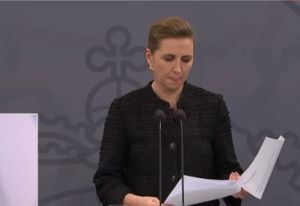News
New restrictions levelled on culture and restaurant sectors
This article is more than 4 years old.
Cinemas, amusement parks, theatres, museums, aquariums and zoos are being shut down for the next four weeks, while bars and restaurants see more stringent measures

Yeah, the list of restrictions is getting long (photo: Screenshot)
Yesterday, it emerged that a record high number of Corona cases were registered, prompting the government to entertain more restrictions.
Just moments ago, PM Mette Frederiksen spoke to the nation as the government unveiled the new measures.
And it was particularly the culture sector that bore the brunt, with cinemas, amusement parks, theatres, museums, culture houses, aquariums and zoos being shut down for the next four weeks.
Additionally, casinos, play and swimming centres will shut its doors, as will conferences, lectures, assembly buildings, indoor sports activities involving paying guests and event facilities.
“The goal is not zero infected, but rather getting the epidemic under control so it doesn’t collapse the health care sector,” said health minister, Magnus Heunicke.
READ ALSO: More restrictions loom as Denmark hits 10,000 daily COVID-19 cases
Dining and drinking out measures
Furthermore, restaurants, cafes and bars must halt alcohol sales at 22:00 and close down by 23:00.
There will also be a ban on alcohol sale in general from 22:00-05:00 and …
– Indoor areas will be limited to 2 sqm per seated guest and 4 sqm for standing guests.
– Staff who have contact with customers must wear facemasks or visors, whether the customers can provide a coronapas or not.
– Health authority information material and hand sanitiser must be made available to the public.
– Employers are urged to have employees work from home and citizens are encouraged to limit social contact over Christmas.
Five key areas
Frederiksen underlined that there were five central areas that the government were looking at in terms of preventing Corona from further spreading.
1 – immunity within the population via the vaccination program
2 – reducing illness through new medication and vaccines
3 – breaching more infection chains
4 – particular attention on protecting the elderly and vulnerable
5 – activating the entire health service and arming it to handle the illness burden
Until the new restrictions come into effect, Parliament must approve them.
The news comes as yet another new record of 11,194 cases emerged over the past 24 hours.










































